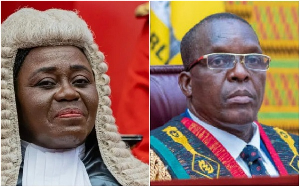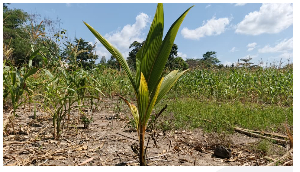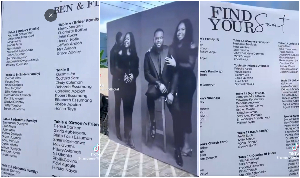The 1992 Constitution of Ghana clearly defines the role of the three arms of government: the legislature, which the Speaker of Parliament heads; the judiciary, headed by the Chief Justice; and the executive, headed by the President of the Republic.
Specifically, Article 93(2) of the Constitution provides that the legislative power (law-making) shall be vested in Parliament; Article 58(1) provides that the executive authority (law enforcement) shall be vested in the President; while Article 125(3) provides that the judicial power (interpretation of law) shall be vested in the judiciary.
In accordance with the principle of separation of powers, the powers of each arm of government are expected to be exercised by the Constitution.
To avoid bestowing preponderant power on any of the arms of government, the Constitution has a system of checks and balances. For instance, when the legislature passes a law, it has to be approved (assented to) by the executive. The legislature also oversees the executive's actions (appointments, expenditures). The judiciary also has review powers which allow it to declare the legislature and executive actions unconstitutional.
However, it appears the 'checking and balancing' is not sitting well with the current Speaker of Parliament, Alban Bagbin, who has accused the executive and the judiciary of scheming to undermine the authority of the legislature.
At a press briefing, on Wednesday, November 6, 2024, Speaker Bagbin accused the judiciary, the Supreme Court specifically, of allowing itself to be used by the executive to interfere in the workings of Parliament by undoing actions taken by the House under the guise of judicial review.
But are the Speaker's claims mere propaganda or something Ghanaians should be worried about?
Here are instances in which the Supreme Court has overruled the decisions of Parliament:
Supreme Court strikes out sections of 'wee law':
In July 2020, the apex court, in a 4-3 decision, held that Section 43 of the Narcotic Control Commission Act, 2020 (Act 1019) violated Article 106 of the 1992 Constitution, which details the processes a bill must go through before it is passed into law by Parliament and was therefore null and void.
In other words, the court ruled that the section of the Narcotic Control Commission Act, 2020, which allows a licence to be granted to an entity to cultivate a small quantity of cannabis, popularly referred to as "wee", in Ghana for industrial and medicinal purposes, is unconstitutional.
"The plaintiff's action succeeds. Accordingly, Section 43 of the Narcotics Control Commission Act, 2020 (Act 1019) is thereby declared null and void and struck out as unconstitutional as it contravenes the letter and spirit of the Constitution, 1992, particularly Article 106 (2) (a) (b), (5) and (6) thereof," the court held.
The case, which culminated in the judgment, was filed by one Ezuame Mannan against the Attorney-General.
Justices on the majority side were Justices Jones Dotse, Clemence Jackson Honyenuga, Henrietta Mensa-Bonsu, and Emmanuel Yonny Kulendi.
Justices Nene Amegatcher, Prof Nii Ashie Kotey, and Issifu Omoro Tanko Amadu dissented.
The court explained in the explanatory memorandum attached to the Bill placed before the House that it did not set out in detail the policy change, the defects in the existing law, and the necessity to introduce a law to licence the cultivation of cannabis.
"The mode of introduction of Section 43 of Act 1019 violates the letter and spirit of the Constitution. Accordingly, Section 43 is hereby struck out as unconstitutional.
"The lack of debate on Section 43 of Act 1019 amounts to not only a direct violation of the letter of Article 106 of the Constitution but also a violation of the spirit of the law.
"There was conspicuously no debate over such a critical shift in policy by Parliament. Needless to say, this conduct and mode of law-making defeats the transparency and accountability enjoined by the Constitution," graphic.com quoted the court as having said.
Supreme Court strikes out aspects of Standing Orders of Parliament:
The apex court of the land in March 2022 struck out aspects of the Standing Orders of Parliament, Order 109(3), which says a deputy speaker or any other member presiding shall not retain his original vote while presiding.
The court also ruled on this action, as it dismissed an application to pronounce as unconstitutional the passage of the 2022 budget statement because the 1st Deputy Speaker of Parliament, Joseph Osei Owusu, counted himself as part of the quorum needed to pass the budget while presiding.
The application was filed by private legal practitioner and law lecturer, Justice Abdulai, after the first deputy speaker's action helped the government get the numbers to pass the 2022 budget.
He argued that in the context of Articles 102 and 104 of the 1992 Constitution, the Deputy Speaker was not permitted to count himself for the purposes of quorum since he had neither an original nor a casting vote as Speaker presiding.
However, the 7-member panel of justices of the Supreme Court ruled that Osei Owusu, the Member of Parliament for Bekwai, exercised his right constitutionally as he is the representative of his constituents.
Supreme Court strikes out sections of Companies Act, 2019:
The Supreme Court, on November 8, 2023, struck out section 13(2)(h) (i) and (ii) of the Companies Act, 2019 (Act 992), which it said was inconsistent with Article 19(2)(c) of the 1992 Constitution.
According to dennislaw.com, this was the judgment in a constitutional matter filed by a lawyer, Derick Adu-Gyamfi, who prayed to the apex court to inter alia delete, expunge, or strike out subsections of the Companies Act, 2019 (Act 992).
The applicant said those subsections 2(h)(I), 2(h)(ii), 2(a)(i), I(c), etc., of Sections 13, 172, and 177 of the Act, are unconstitutional and violate the principle of fair hearing among others.
1st and 2nd ladies are not eligible for ex-gratia, salaries of cabinet ministers – Supreme Court rules
The Supreme Court also, in April 2024, overruled a decision by Parliament that 1st and 2nd ladies should be entitled to benefits of Article 71 officeholders, including ex-gratia benefits.
The ruling of the apex court of the land was on suits challenging parliament-approved recommendations by the Prof Yaa Ntiamoa-Baidu-led committee on emoluments for Article 71 officeholders that spouses of President Nana Addo Dankwa Akufo-Addo and Vice President Dr Mahamudu Bawumia should receive the same monthly salaries as cabinet ministers.
A seven-member panel of the Supreme Court, presided over by Chief Justice Gertrude Torkornoo, with Justice Gabriel Pwamang, Justice Lovelace Johnson, Justice Prof Henrietta Mensa-Bonsu, Justice Barbara Ackah-Yensu, Justice Ernest Gawu, and Justice Samuel Asiedu as members, delivered the judgment in the two separate suits challenging the payment of salaries approved for first and second ladies.
The Member of Parliament for South Dayi, Rockson-Nelson Dafeamekpor; MP for Builsa South, Dr Clement Apaak; and Nii Tackie Commey, a private citizen, in one of the cases, sued the Attorney General, asking it to reverse the payment of emoluments for 1st and 2nd ladies.
Also, in a separate action, the Bono Regional Chairman of the New Patriotic Party (NPP), Kwame Baffoe, popularly known as Abronye DC, filed a similar action against the state.
Supreme Court overturns Bagbin declaration of four seats vacant:
The most recent ruling of the Supreme Court, which outlawed a decision of Parliament, is the court's declaration that Speaker Bagbin's declaration of four seats as vacant was unconstitutional.
On Tuesday, November 12, the apex court of the land overturned Speaker Alban Bagbin's declaration of four seats as vacant. The judgment followed an application by Effutu MP Alexander Kwamina Afenyo-Markin, who challenged the Speaker's decision.
Through his lawyers, Afenyo-Markin, who remains Majority Leader, sought clarity on the constitutional basis for Bagbin's decision. Article 97 of the Constitution states that "A Member of Parliament shall vacate his seat in Parliament – (g) if he leaves the party of which he was a member at the time of his election to Parliament to join another party or seeks to remain in Parliament as an independent member…. (h) if he was elected a Member of Parliament as an independent candidate and joins a political party."
Afenyo-Markin's request led the court to declare the Speaker's interpretation of Article 97 (g) and (h) incorrect, reversing the Speaker's declaration that seats held by Andrew Amoako Asiamah (Fomena), Cynthia Mamle Morrison (Agona West), Kwadwo Asante (Suhum), and Peter Yaw Kwakye-Ackah (Amenfi Central) were vacant.
The Chief Justice, delivering the court's decision, confirmed that the application by the Majority Leader was upheld by a 5-2 majority. Two justices opposed the application on grounds of jurisdiction.
The justices who supported the application were Chief Justice Gertrude Torkornoo, Justice Mariam Owusu, Justice Samuel Kwame Adibu-Asiedu, Justice Ernest Yao Gaewu, and Justice Yaw Darko Asare. Those who dissented were Justice Avril Lovelace Johnson and Justice Issifu Omoro Tanko Amadu.
Injunction against anti-gay bill:
Another action of Parliament which is currently at the mercy of the Supreme Court and is yet to be determined is the Promotion of Human Sexual Rights and Family Values Bill (anti-gay Bill) which the House passed on Wednesday, February 28, 2024.
The Bill, which outlaws LGBT activities and criminalises their promotion, advocacy, and funding, is currently awaiting presidential assent.
Persons caught in these acts will face a six-month to three-year jail term, while promoters and sponsors will face a three to five-year jail term. The Bill requires presidential assent to come into force within seven days. If President Akufo-Addo refuses to assent to the Bill, Parliament can pass it into law by a two-thirds majority vote.
The Office of the President has instructed Parliament not to transmit the anti-gay Bill until two legal actions against the Speaker on the passage of the Bill in the Supreme Court are resolved.
Speaker Alban Bagbin, at the press conference on Wednesday, pointed to the handling of the anti-gay Bill as an example of the executive and the judiciary colluding to undermine the legislature.
He emphasised that the President, Nana Addo Dankwa Akufo-Addo, has no authority to instruct Parliament not to transmit the Bill for assent. He also stated that the judiciary, which is hearing two suits against him on the anti-gay Bill, cannot interfere in the legislative process and can only act on the Bill once it becomes law.
BAI/OGB
Watch George Ayisi's interview with Adam Bonaa on the recent unrest in Bawku below:
You can watch today's compilation of the Twi news below:













